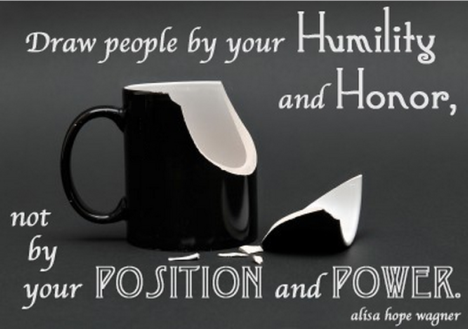
Corruption, greed, and addiction to power and control over others ooze from the pseudo-leadership of so many contemporary leaders.
Adding insult to injury is that most of these people actually think they are virtuous. But everyone else around knows differently.
Authentic Spiritual Leadership
And yet, it is clear to anyone who studies authentic spiritual leadership that it is not based on power but on humility. This is a new model, a totally different way of thinking about leadership. This is the leadership of those who are aware of their vocation—they know they have not earned their leadership; it has been given to them.
Unfortunately, so many go through life today convinced that leadership is power.
Such superficial people fail to grasp the ultimate meaning of life or their own true destiny within the context of human development. There is no role in leadership today for arrogant, narcissistic people who emphasize their own self-importance, status, prestige, and power. One great mistake is at the root of all failed leadership—pride, and its constant focusing on self.
Leading With Honor
It is frequently the case that a leader has a place of honor in community, and he or she usually exceeds followers in many areas of organizational life with its interpersonal and task oriented skills. ‘
But such leaders should not exaggerate their own importance but rather insist on the importance of others and their gifts.
Leadership ultimately implies self-surrender, interpreting one’s meaning in life in the broader context of human development. Being able to appreciate the mystery of life and leadership as gifts helps one to be humble, to be one’s authentic self, to honestly know one’s strengths and weaknesses, and to engender genuine respect for others and their gifts.
Humility in Leadership
Humility in leadership is a recognition of one’s humanity and place in community. We are not in this world for our personal enhancement but to live and grow in solidarity with others. We are all struggling and striving to grow, and equally share in a spirituality of failure just as much as in one of mutual enrichment.
Even in our personal journey of spiritual leadership we can give ourselves permission to be less than perfect, as we experience insecurity, failure, and poverty.
Humility gives us the ability to bounce back, try again, experiment with fresh ideas, and stand up to resistance.
Humility helps us have faith, hope, and love in others, and especially in ourselves. Often there is more wisdom and courage in dealing humbly with failure than in expecting success all the time. Moreover, we learn so much in our humility that can help us in dealing with others. This is the paradox of leadership that our failures become successes, our weaknesses become strengths, and our own pain can teach us how to heal others.
Really Appreciating Others
Humility will teach us to appreciate others, to be more accountable, to keep a just perspective on efforts and results. It teaches us never to judge others without first judging ourselves. Humility reminds us not to belittle others, or criticize them, or to fail to give others our undivided attention. It insists we should not be pre-occupied with ourselves, to play favorites with others, to make distinctions based on status, or to embarrass people around us.
Above all humility teaches us to trust others, to practice integrity, to be open to improvement, and to be sincere in everything we do.
From the very start of one’s leadership of others one must be ready to live with an honest vulnerability. The leader recognizes that leadership is a gift and is always aware of his or her own weak and lonely experience of self. He or she knows there is strength in discipline but also in honest vulnerability.
Not About Power
Leadership is not a way to power over others but a call to nurture the gifts of others. It means letting go of the desire to be always right, or to always have the answers. Successful leaders who admit their mistakes clearly earn more respect from their followers than do those who unsuccessfully try to hide them.
Some mistakes cause pain to others, but a good leader can acknowledge wrongdoing and genuinely apologize.
However, the leader also experiences the pain of failure without becoming insecure, and he or she can bounce back from suffering with an appreciation of how other people feel in times of hardship. Each one must ask if he or she is comfortable or afraid to let others see his or her leadership weaknesses. Of course, if a leader cannot accept his or her own limitations, he or she will probably have more difficulty accepting the limitations of others.
**********
Never miss an issue of Linked 2 Leadership, subscribe today here.
Learn, Grow & Develop Other Leaders™
——————–
Dr. Leonard Doohan is an author and workshop presenter
He focuses on issues of spiritual leadership
Email | LinkedIn | Web | Blog
Image Sources: media-cache-ak0.pinimg.com
Related articles
- Leadership Begins With Humility (graemeo28librarianbiker.wordpress.com)
- Authentic leadership – just for saints? (angelasabinexecutivelifecoaching.wordpress.com)
- the power of humility (awakenedleadership.wordpress.com)

Solid and soulful. Well done…
Great commentary! Every great leader is only as good as the team under them. The world has changed and you cannot treat people as cattle. You treat other just like you would like to be treated. Recognize and encourage them!
Reblogged this on kwalitisme.